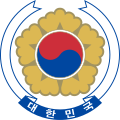
Back JTBC Afrikaans جاي تي بي سي Arabic JTBC AST JTBC Azerbaijani JTBC BAT-SMG Джей Ти Би Си Bulgarian JTBC Catalan JTBC Czech JTBC Welsh JTBC Danish
This article may require copy editing for grammar, style, cohesion, tone, or spelling. (December 2024) |
 | |
 The JTBC Trust Building located in Digital Media City | |
| Founded | March 21, 2011 |
|---|---|
| Headquarters | 48-6, Sangamsan-ro, Mapo District, Seoul , South Korea |
Area served | South Korea |
Key people |
|
| Owner | JoongAng Holdings Ltd. (25%) DY Asset (5.92%) JoongAng Ilbo (4.99%) Warner Bros. Discovery (5.72%) S&T Dynamics (2.37%) Sungwoo Hitech (2.37%) Sungbo Cultural Foundation (1.18%) Daehan Steel (1.18%) Ace Bed Co. (1.18%) Hanssem Co. (1.18%) |
| Subsidiaries | SLL JTBC Mediacomm JTBC Mediatech JTBC Plus |
| Website | jtbc |
| Country | South Korea |
|---|---|
| Broadcast area | South Korea, Worldwide |
| Programming | |
| Language(s) | Korean |
| Picture format | 1080i (HDTV) |
| Ownership | |
| Owner | JTBC |
| History | |
| Launched | December 1, 2011 (cable) |
| Availability | |
| Streaming media | |
| JTBC On air | Watch live (only in South Korea) |
| Joongang Tongyang Broadcasting Company | |
| Hangul | 중앙동양방송 |
|---|---|
| Hanja | 中央東洋放送 |
| Revised Romanization | Jungang Dongyang Bangsong |
| McCune–Reischauer | Chungang Tongyang Pangsong |
| This article is part of a series on |
| Conservatism in South Korea |
|---|
 |
JTBC (shortened from Joongang Tongyang Broadcasting Company; Korean: 제이티비씨; stylized in all lowercase) is a South Korean nationwide pay television network. Its primary shareholder is JoongAng Holdings, with a 25% stake.[1] It was launched on December 1, 2011.[2] JTBC is a generalist channel, with programming consisting of television series, variety shows, and news broadcasting; its news division is held in similar regard to the three main terrestrial networks in South Korea.[3]
In 2011, JTBC was one of four new South Korean nationwide generalist cable TV networks alongside The Dong-a Ilbo's Channel A, The Chosun Ilbo's TV Chosun and Maeil Business Newspaper's MBN.[4][5][6][7][8] They serve as supplementary networks to the existing conventional free-to-air TV networks like KBS, MBC, SBS and other smaller channels launched following deregulation in 1990.
- ^ Choi, Hee-jin (January 3, 2011). 종편 주주 현황 어떻게. Kyunghyang Shinmun (in Korean). Retrieved May 12, 2020.
- ^ Shin, Hae-in (November 30, 2011). "New cable channels go on air". The Korea Herald. Archived from the original on March 3, 2016. Retrieved June 2, 2013.
- ^ "South Korea country profile". BBC News. October 19, 2011. Retrieved March 28, 2025.
- ^ Kim, Tong-hyung (December 12, 2011). "What else can new channels do to boost ratings?". The Korea Times. Archived from the original on January 8, 2014. Retrieved June 2, 2013.
- ^ Noh, Hyun-gi (January 4, 2012). "Four new TV channels face uncertain futures". The Korea Times. Archived from the original on January 8, 2014. Retrieved June 2, 2013.
- ^ Yoon, Ja-young (January 20, 2012). "Low ratings weigh on new channels". The Korea Times. Archived from the original on January 8, 2014. Retrieved June 2, 2013.
- ^ Kim, Tong-hyung (June 2, 2012). "New channels remain 'anonymous'". The Korea Times. Archived from the original on January 8, 2014. Retrieved June 2, 2013.
- ^ Kim, Tong-hyung (November 29, 2012). "New TV channels are niche, not gold mine". The Korea Herald. Archived from the original on October 27, 2020. Retrieved June 2, 2013.
© MMXXIII Rich X Search. We shall prevail. All rights reserved. Rich X Search